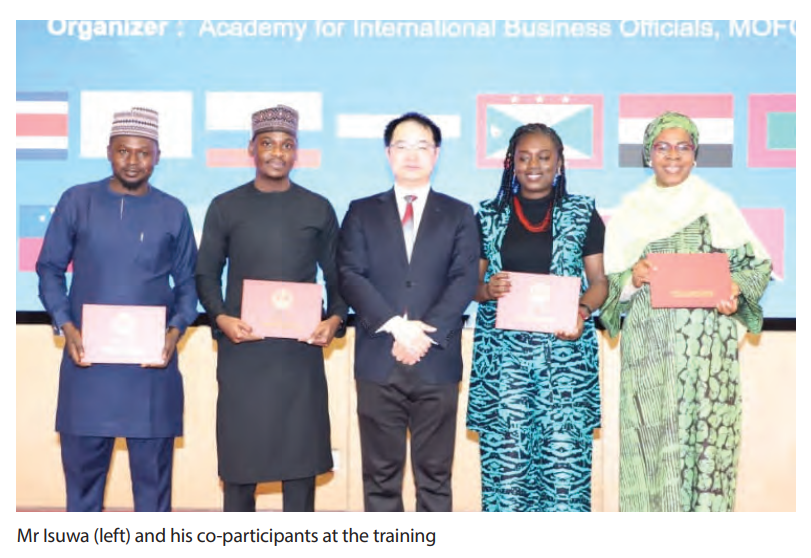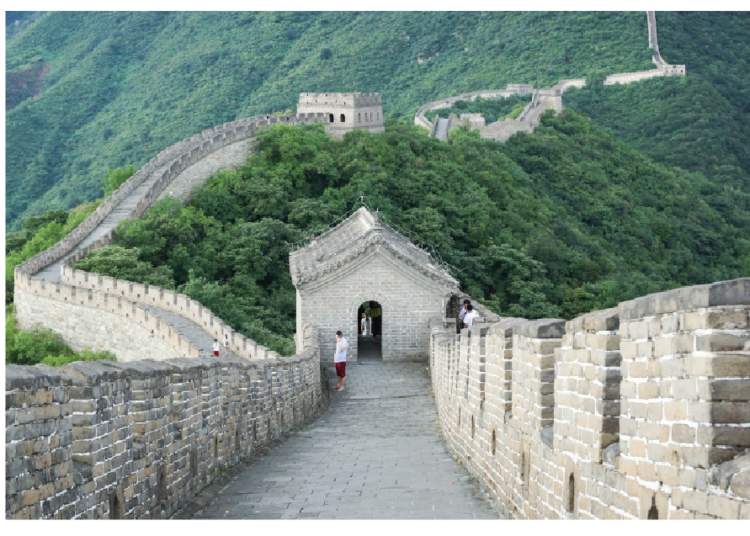In Nigeria and much of Africa, when one mentions China, it often conjures images of products that lack durability. It brings to mind people who appear alike and are of shorter stature. It also evokes thoughts of industrious individuals striving to advance their interests.
However, after a cumulative flight of approximately 16 hours from Abuja, Nigeria, my perception shifted dramatically upon landing in Beijing, the capital city of the Peoples Republic of China (PRC).
The term “Peoples” carries significant weight and meaning to the Chinese populace. It challenges the stereotype that Chinese are a singular tribe, short in stature and produce inferior goods.
Haven promised a glimpse of the real China, I could not quite grasp what that entailed until our visit to the Great Wall, located just outside Beijing.

After gazing at the magnificent structure and climbing its ancient steps, I began to appreciate the perseverance of the Chinese people who built a wall that stretches from their homeland to Mongolia.
Climbing the Great Wall imparted valuable lessons —one of which is the perseverance that has propelled the Chinese towards greatness. This experience highlighted the incredible work ethics of the Chinese which has contributed to their remarkable developments in the last 40 years.
An official, Yang Boazhin noted that before this period, China was poorer than many parts of Africa. She recounted her visit to Africa in 1985 as a diplomat, affirming that Africa had great potential for development at that time.
The Peoples Republic of China, with a population of about 1.4 billion, comprises four municipalities and 23 provinces, alongside five autonomous regions that represent various ethnic groups and 21 special administrative regions.
“China respects its ethnic minorities; that is why there has been no civil war. Our stability is key to development,” she stated.
Boazhin noted that Hong Kong, previously under British rule, is now a free area for business.
“China is comparable to Europe and has a population that is one-third that of Africa. We share borders with 14 neighbours, more than any other country. China represents 18 per cent of the world’s total population and is home to 56 ethnic groups. The state holds more power than religion,” she elaborated.
The diplomat explained that Emperor Qin Shi Huang unified China in 221 BC, although the country does not practice federalism. The central government has endured for over 2,000 years, governed by 408 emperors across 16 dynasties.
The Great Wall of China, now a significant tourist attraction, was built primarily for defence, not expansion. It traverses 15 regions and has undergone 14 restoration efforts.
China’s industrialisation began with the invention of gunpowder, the compass, printing and papermaking —contributions that advanced human civilisation.
The Song dynasty, from the 10th to 13th century, initiated printing, while Zheng He, a notable leader, commenced maritime exploration from 1405 to 1433.
“We never enslaved people in Africa, nor did we seize land or force anyone to learn our language even before 1492, and we possessed the capability,” Boazhin remarked, revealing the foundations of China’s foreign strategy that remain relevant till date.
Despite its potential for wealth at that time, China was overtaken by the UK during the Industrial Revolution.
“The Opium War, which began in 1850, was triggered by China’s decision to burn opium and prohibit its use among our citizens, leading to invasion by Western powers. Consequently, Shanghai was occupied and Hong Kong fell under British control, weakening our nation,” she explained.
In 1911, Yat-sen led a popular revolution that resulted in a republic but it failed, paving the way for the Chinese Communist Party’s emergence in the same year, which ultimately led to the current leadership in China.
Mao Zedong established the Peoples Republic of China in 1949, with a population of 540 million. Today, China’s political system is socialist under the Communist Party of China (CPC). For 78 years, the CPC has ruled despite the existence of eight other political parties that provide opposing views in alignment with the interests of the state.
In 1953, China built its first national industrial base and developed agriculture to ensure food security for its populace, even transforming 15 per cent of its desert and mountainous regions into farmland.
By 1964, China successfully tested its atomic and hydrogen bombs. In 1970, Deng Xiaoping proposed reforms to uplift the people by altering the approach to construction.
The year 1978 marked a pivotal moment for the Chinese people, ushering in a cultural revolution when China’s per capita income stood at just 156 USD.
China transitioned into rural reforms, empowering farmers to remain in their communities, some of which were dubbed Hero Bay Villages. Farmers were compensated for their residency, provided land and offered various incentives.
During this time, the government increased grain purchase prices, effectively alleviating hunger and starvation. The Chinese take pride in having minimal severe poverty.
Private car ownership is not a significant concern for many, as reforms in the transport sector have connected all communities, villages and towns through various train lines, buses, internet access, power supply and electricity.
These advancements have opened China’s economy to the world, beginning with the coastal areas of Hong Kong, which attracted foreign capital investment.
Four special economic zones were established, including Shenzhen, once a small village near Hong Kong, now an industrial hub. Shenzhen boasts of a population of 18 million and a GDP of $3.68 trillion, making it the 11th largest city worldwide.
China established its socialist economic system in 1992 and joined the WTO in 2001, facilitating the global presence of Chinese products.
The past 40 years of reform have significantly boosted the Chinese economy, drawing investment from 450 global companies.
China’s automotive sector has experienced explosive growth, promoting urbanisation and does not recognise dual nationality.
The progress made in China over the last 40 years is remarkable with plans to construct over 2,000 highways.
China is a major player in the technology sector, having implemented its GPS system in 2021.
In 2024, over 500,000 industrial robots were produced in China, with the CPC Congress setting ambitious goals.
The Chinese population now enjoys longer life expectancies due to a robust healthcare system. The government provides special care for children, a lower mortality rate, and dedicated services for senior citizens, who do not pay for social services, including subsidised food.
Compulsory education is in place for children until the age of nine and there is a national strategy to train talented individuals, with approximately 3,200 universities and colleges accommodating a 99.9 per cent enrolment rate.
China’s commitment to reducing carbon emissions has led to a focus on manufacturing electric vehicles and utilising clean energy sources such as wind and solar power.
With clean water and sanitation, China operates a digital economy. Previously, late tax payments would incur penalties but now, citizens can conveniently pay taxes using their mobile phones and IDs within seconds, thanks to internet access for over 730 million of the 1.4 billion population.
To ensure job availability for its citizens, China creates 15 million jobs annually across all sectors, lifting 800 million people out of poverty between 1979 and 2020. The ageing population, 60 years and above, now stands at 310 million, representing 18 per cent of the total population.
The Chinese government boasts of zero tolerance for corruption with both the ruling party and opposition adhering to this principle.
Experts suggest that if China and developing nations can collaborate, the world would be a better place.
During a seminar for heads of journalistic organisations from Belt and Road Initiative partner countries, the deputy director of the Executive Department of China-Aid Training Programmes, Mr Wu Hao, said, “You will encounter the real China, its culture, people and history.”
After two weeks in this vast and remarkable country, we indeed met the people, their culture, their way of life and thinking. We experienced the real China and I found it to be incredibly impressive.
As Mr Wu spoke of China’s philosophy, ideology and practices, it became clear that working together for peace is an essential path forward.
On the journey towards modernisation, as Mr Wang Yongzhong shared, these extraordinary individuals have been diligently working towards achieving such success.
From the very first day of my arrival in China, I observed ongoing construction for new lines of the Beijing underground.
President Xi Jinping’s vision, aimed at benefitting impoverished nations and peoples globally, has placed China at the forefront of respect, appreciation and gratitude from millions across Asia, Oceania, Latin America, Africa and Europe.
During a lecture by Mrs Xu Zhengyuan, the implementation of the Belt and Road Initiative (BRI) was discussed. In recent years, China has been the fastest-growing economy in the world.
To be frank, my three-day visit to Chongqing — an exceptional experience at the Chongqing International Logistics Hub Exhibition Centre, Hero Bay Village, along with relevant meetings at the Chongqing Media Group and the Western China International Communication Organisation Centre — demonstrated that China is decades ahead!
This massive infrastructure investment aims to enhance connectivity, trade and communication across Eurasia, Latin America and Africa.
China has supported the construction of airports, ports, power plants, bridges, railways, roads and telecommunication networks, striving to enhance economic connections and collaborations. The results of this initiative are perceived by the people of the beneficiary countries as a kind of divine gift.
Since it is impossible to bring everyone to witness the real China or to showcase the results and benefits globally, the most persuasive evidence lies in these undeniable facts and figures.
A visit to the Great Wall exemplifies the greatness of China.
In many cultures, children are taught to study and work hard to amass wealth. In contrast, Chinese culture instils values that encourage children to learn valuable skills to aid others, enhance society and contribute to their country’s betterment.
As a product of this mindset and culture, the Chinese people have indeed transformed their homeland into a prosperous nation.
A short film presented by Professor Zhang Long, showcasing volunteers who worked tirelessly to transform the Mu Us Desert into a green paradise, could evoke deep emotions.
China’s achievements, the Belt and Road Initiative, its contributions to impoverished nations and peoples, its rapidly growing economy and its rich culture and civilisation, are lessons that Nigerians and Africans should embrace if they are to advance.





